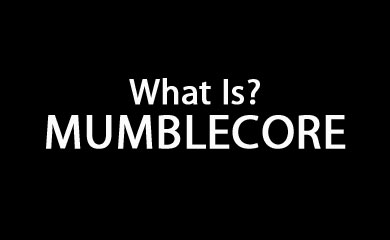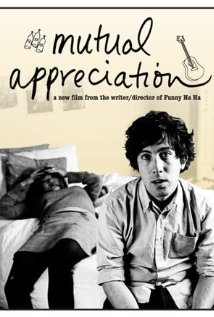Originally published in eXiled Online in 2012.
For other examples of Eileen’s work, see:
Don’t know if you’ve ever seen a mumblecore film. Probably not, if only because the term “mumblecore” is so twee and horrible, it would instinctively repel you. It’s a millennial American film development, around for quite a while now but not widely known outside indie film circles, and for good reason. Fantastically boring films. Known for being deliberately torpor-inducing. It’s a point of real pride to mumblecore filmmakers that nothing much happens in their films, and what doesn’t happen unfolds very, very slowly and naturalistically.
If you want your dictionary.com definition, here it is:
mumblecore: a genre of low-budget movies using nonprofessionals to depict mundane post-college or early adult existence. The term “mumblecore” was coined by Eric Masunaga, a sound editor, in 2002.
I avoided these films, of course, realizing they’d be my kryptonite. And so it proved, when I finally watched one. As maddening as an all-over rash while at the same time, paralyzingly dull, deeply depressing, ultimately debilitating. Be warned! If you’ve never experienced M and you want to experiment, make sure there’s no gun in the house! You’ll use it!
The film I watched was called Mutual Appreciation, because I was told by a fan of the form that it was highly representative. It’s the second film directed by Andrew Bujalski, sometimes referred to as “the godfather of mumblecore” because his debut film, Funny Ha Ha in 2002, is supposedly the first one of these toxins ever introduced into the American filmmaking system.
As is typical in these films, I gather, Mutual Appreciation features white hetero twenty-somethings from middle-class-to-affluent backgrounds leading vague indeterminate lives which are minutely observed as if those lives were interesting, which they are not. Some have “McJobs”; all have no idea what to do with themselves beyond giving various “creative” projects a try, like halfhearted performance art stuff or blandly alternative rock bands that go nowhere. They drift in and out of semi-relationships and speak in inarticulate, inconclusive phrases which represent their undramatic “lives of lowered expectations.”
The non-pro actors, all extraordinarily homely even beyond what you see on the streets, run to sad weedy little guys and aggressively plain women. In a lot of mumblecore films, apparently, performers play versions of themselves, working out their own character development and improvising their lines, though supposedly director Bujalski scripts all his films thoroughly. In Mutual Appreciation, dweeby indie rocker Justin Rice plays a dweeby indie rocker presumably a lot like Justin Rice, performing Justin Rice’s band’s music. Bujalski plays the other main character, the froggy-faced guy in thick glasses.
Don’t dream that there’ll be anything or anyone you’ll want to look at just to distract yourself!
Mutual Appreciation is a crappy-looking film in a tame, undistinctive, messy black-and-white way. I gather that’s another point of mumblecore pride, a DIY aesthetic, rendered harmless. Whereas a deliberately raw, ugly aesthetic achieved on the cheap can be great and electrifying (see punk rock, “The Aesthetic of Hunger” film manifesto, The Texas Chainsaw Massacre, etc.), here it’s just… well, I don’t know what it is. I don’t know if they know what it is. A producer of wry smiles and self-hugs? “Yeah, we sure are screwed, but it looks kinda cute on us, especially when we wear ironic knitted caps with earflaps and things.”
The kindest thing I could say about the film is, maybe I didn’t get it. It seemed to me there was a conspicuous quality of smug self-congratulation in the film that hardly seemed possible given how fundamentally repugnant the whole thing was, so I asked the fan who recommended it what the effect of it was supposed to be. Was it supposed to be funny, or charming or something? Were you supposed to recognize yourself in these characters and feel fond of them and amused by their foibles? Yep, he said. All of the above.
Which, to me, was astounding, having that suspicion confirmed. I had held out one tiny sliver of hope that the film was actually supposed to be an annihilating satire, a kind of “This is the way the world ends, not with a bang but a whimper” scenario, and it was just too subtle for me and I missed it. But no. No!
Here’s the only good side-effect of the film: after the initial weary despair that cripples you, it makes you want desperately to feel the blood circulating in your veins, to act decisively, to feel intensely, to believe fiercely, and to be as overly, fulsomely articulate as a classically trained orator holding forth in complete paragraphs.
Anything to be NOT like these people. The characters, the filmmakers, or the fans, who seem to be all mixed up together in a thin soup of unjustified millennial self-love. Why do these people love themselves so much? I don’t get it. Just because they’re not baby boomers, who are hoarding all the jobs and pensions and all? Baby boomers are loathsome, sure, most people are loathsome, but it’s no answer to be merely DIFFERENTLY loathsome. That doesn’t make you any good!
The fan tried to explain it to me, why mumblecore milleniallism is preferrable. He says previous generations, even Generation Xers, in their films, have a tendency to, uh… be, uh… kinda… to tend to, like, build up to something uh… melodramatic? And that was uh....that was uh....
Bad, I gathered. That was bad. Mumblecore millennials, they keep their blood pressure down and their pulse rates level at all times, and that’s some sort of positive virtue or something, even if it never leads to anything, not even a complete sentence.
John Dolan has a theory about all this:
Mumblecore sounds to me like something that could be very tidily explained in Marxist terms: The development of an aesthetics and accompanying ideology that’ll make the sudden squeeze [of America’s economy] into boardroom elite and mass of losers more palatable. [5]
So this is how the formerly privileged make the Big Squeeze feel okay to them, by pretending they’re still superior in a million tiny, precious ways not discernible to the naked eye.
I know, I’m generalizing a lot from watching one film. But the thing is, I don’t think I can risk seeing another; I might have a rage-and-boredom-induced stroke midway through. Just the titles of some of them: The Puffy Chair, In Search of a Midnight Kiss, LOL, Sorry, Thanks…. I don’t think I can do it. Any readers who might’ve seen some of this stuff, please advise: how stroke-inducing are they, exactly?
The fan told me I might like the Duplass Brothers’ films, which have a bit more liveliness, perhaps. (Also that the Duplasses claim to love the Coen Brothers’ film Raising Arizona, because it’s so “performance-based.” I don’t even understand what that means.) Mumblecore’s been crossing over into the mainstream with films like the Duplasses’ Cyrus last year and now their Jeff Who Lives at Home, currently in theaters. It seems there’s a sort of merger happening between mumblecore filmmaking and the Judd Apatow comedy troupe, the fan said, and that means there’ll be more of this stuff around the multiplex, not just at film festivals and indie/art-house theaters in New York and LA.
So look out: more mumblecore millennialism is whimpering its way toward a theater near you.






